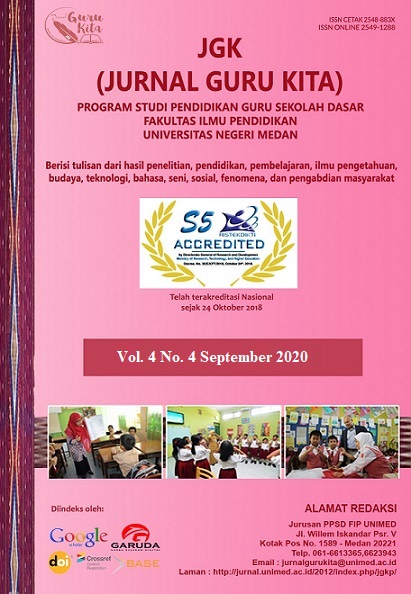PENINGKATAN KETERAMPILAN DAN HASIL BELAJAR TEMATIK PADA MATERI PECAHAN MELALUI PENERAPAN PENDEKATAN CTL (CONTEXTUAL TEACHING AND LEARNING) SISWA KELAS III SD NEGERI PERUMNAS PEUNYARENG TAHUN AJARAN 2021/2022
DOI:
https://doi.org/10.24114/jgk.v6i3.37170Keywords:
Learning Outcomes, Skills, CTL, Fractions, ThematicAbstract
Abstract: Improving Skills and Thematic Learning Outcomes in Fractional Materials Through the Application of the Ctl (Contextual Teaching and Learning) Approach for Class III Students of Public Elementary School Peunyareng, Academic Year 2021/2022. This study aims to improve the Skills and Learning Outcomes of Fractions in Thematic Learning of Grade III students of SD Negeri Perumnas Peunyareng, Academic Year 2021/2022. The model used in this classroom action research is the CTL (Contextual Teaching and Learning) approach. The subjects of this classroom action research are students III of SD Negeri Perumnas Peunyareng, Academic Year 2021/2022. The number of students is 15 students with 10 male students and 5 female students. This classroom action research is carried out in the 2021/2022 Academic Year. This classroom action research is carried out over a period of 3 months, from February 2022 to April 2022 in the even semester. The methodology of this research is classroom action research consisting of two cycles and each cycle consists of two meetings. Each cycle consists of planning, implementing, observing and reflecting. The research procedure consisted of pre research, planning cycle one, implementing cycle one action, observing cycle one, reflecting on cycle one, planning cycle two, implementing cycle two, observing cycle two and reflecting on cycle two. The data collection technique is collecting test scores which are carried out at the end of each learning cycle in each cycle using a question instrument (written test). Observation data is done by looking at the students' skills in the learning process. Data were analyzed by means of percentage statistics. The results showed that there was an increase in the mastery of student learning outcomes from 34.78% in the pre-study to 60.86% in the first cycle and increased to 78.26% in the second cycle. Student learning skills have increased from moderate to good category and good category to very good category. The CTL (Contextual Teaching and Learning) approach can improve skills and thematic learning outcomes in fractions of third grade students at SD Negeri Perumnas Peunyareng, Academic Year 2021/2022References
Budiarjo (Sisca Folastri, 2013: 2 Sisca Folastri. (2013). Konselor Jurnal Ilmiah Konseling Volume 2 Nomor 1 Januari 2013. Diakses.
Depdiknas. 2003. Undang-undang Republik Indonesia No. 14 Tahun 2003 Tentang Guru dan Dosen. Jakarta: Cemerlang.
Degeng, I.N.S. 1989. Strategi Pembelajaran Mengorganisasi Isi dengan Model Elaborasi. Malang: IKIP dan IPTDI.
Hamalik, O. 2002. Proses Belajar Mengajar. Jakarta: Bumi Aksara.
Nirwana, dkk. (2006). Belajar dan Pembelajaran. Padang: FIP UNP.
The Liang Gie. (2002). Cara Belajar yang Efisien. Yogyakarta: Pusat Belajar Ilmu Berguna.
Downloads
Published
How to Cite
Issue
Section
License
Authors published with the JGK (Jurnal Guru Kita) agree to the following terms:
- Authors retain copyright and grant the journal the right of first publication with the work simultaneously licensed under a Creative Commons Attribution License (CC BY-SA 4.0) that allows others to share the work with an acknowledgment of the work's authorship and initial publication in this journal.
- Authors are able to enter into separate, additional contractual arrangements for the non-exclusive distribution of the journal's published version of the work (e.g., post it to an institutional repository or publish it in a book), with an acknowledgment of its initial publication in this journal.
- Authors are permitted and encouraged to post their work online (e.g., in institutional repositories or on their website) prior to and during the submission process, as it can lead to productive exchanges, as well as earlier and greater citation of published work. (See The Effect of Open Access)


























